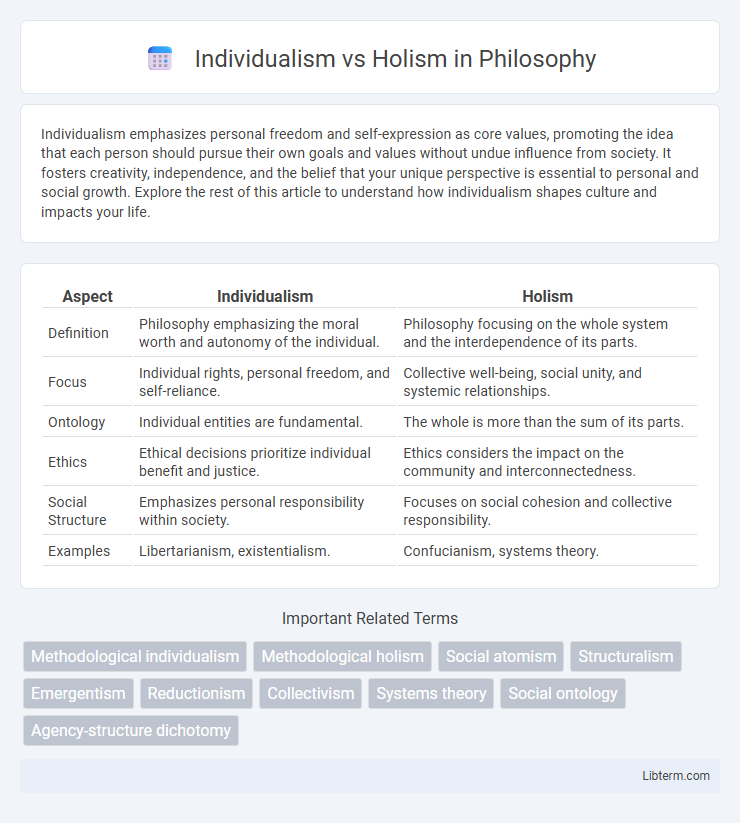Individualism emphasizes personal freedom and self-expression as core values, promoting the idea that each person should pursue their own goals and values without undue influence from society. It fosters creativity, independence, and the belief that your unique perspective is essential to personal and social growth. Explore the rest of this article to understand how individualism shapes culture and impacts your life.
Table of Comparison
| Aspect | Individualism | Holism |
|---|---|---|
| Definition | Philosophy emphasizing the moral worth and autonomy of the individual. | Philosophy focusing on the whole system and the interdependence of its parts. |
| Focus | Individual rights, personal freedom, and self-reliance. | Collective well-being, social unity, and systemic relationships. |
| Ontology | Individual entities are fundamental. | The whole is more than the sum of its parts. |
| Ethics | Ethical decisions prioritize individual benefit and justice. | Ethics considers the impact on the community and interconnectedness. |
| Social Structure | Emphasizes personal responsibility within society. | Focuses on social cohesion and collective responsibility. |
| Examples | Libertarianism, existentialism. | Confucianism, systems theory. |
Understanding Individualism: Core Concepts
Individualism centers on the belief that each person possesses unique rights, autonomy, and intrinsic value, emphasizing self-reliance and personal responsibility. Core concepts include personal freedom, independence, and the prioritization of individual goals over collective needs. This perspective often influences social, political, and economic frameworks by advocating for limited external control and promoting individual decision-making.
Defining Holism: A Comprehensive Overview
Holism is a philosophical approach that emphasizes the importance of viewing systems and their properties as wholes rather than merely as a collection of parts. This perspective asserts that individual components cannot be fully understood in isolation because the interactions and relationships within the entire system shape their functions and meanings. Holism is applied in various fields, including ecology, medicine, and social sciences, to foster integrative understanding and problem-solving.
Historical Roots of Individualism and Holism
The historical roots of individualism trace back to ancient Greek philosophy, particularly the emphasis on personal autonomy and self-realization in Socratic and Stoic traditions, later reinforced by Enlightenment thinkers like John Locke who championed individual rights and liberties. Holism finds its origins in Eastern philosophies such as Confucianism and Daoism, which prioritize the interconnectedness of individuals within the community and nature, emphasizing harmony and collective well-being over individual separation. These divergent worldviews shaped social, political, and ethical frameworks across cultures, reflecting fundamentally different perceptions of the self in relation to the broader society.
Key Differences Between Individualism and Holism
Individualism prioritizes personal autonomy, emphasizing individual rights, freedom, and self-expression, whereas holism stresses the interdependence of individuals within a collective, focusing on community goals and social harmony. In individualism, decision-making is driven by personal interests and individual responsibility, while holism promotes group consensus and the well-being of the entire system. These contrasting perspectives influence cultural values, social structures, and approaches to problem-solving across societies.
Philosophical Foundations: East vs. West Perspectives
Eastern philosophies emphasize holism, rooted in interconnectedness and the collective harmony of self with society and nature, as seen in Confucianism and Taoism. Western thought traditionally prioritizes individualism, highlighting personal autonomy and self-identity, influenced by Enlightenment ideals and philosophers like Descartes and Locke. These contrasting foundations shape diverse approaches to ethics, metaphysics, and social organization within their respective cultures.
Individualism in Modern Society: Pros and Cons
Individualism in modern society promotes personal freedom, self-expression, and innovation by encouraging individuals to pursue their unique goals and values. It fosters economic growth and creativity but can also lead to social fragmentation, increased inequality, and weakened community bonds. Balancing individual rights with societal responsibilities remains essential for sustainable development and social cohesion.
Holistic Approaches in Contemporary Contexts
Holistic approaches in contemporary contexts emphasize integrating physical, mental, and social dimensions to address complex challenges in healthcare, education, and environmental sustainability. These methods prioritize interconnectedness and systems thinking, offering comprehensive solutions that individualistic perspectives might overlook. By fostering collaboration across disciplines and communities, holistic models enhance adaptability and resilience in dynamic global environments.
Individualism vs. Holism in Psychology
Individualism in psychology emphasizes the importance of personal autonomy, self-expression, and individual goals, often highlighting how unique traits influence behavior. Holism, conversely, stresses understanding psychological phenomena by considering the whole person and their social context, integrating cognitive, emotional, and environmental factors. Research in cross-cultural psychology consistently shows that individualistic societies prioritize personal achievement, while holistic approaches are more aligned with collectivist cultures valuing interconnectedness and community.
Influence on Social Structures and Decision Making
Individualism emphasizes personal autonomy and self-interest, shaping social structures that prioritize individual rights and competitive decision-making processes. Holism, by contrast, stresses interconnectedness and collective well-being, influencing social systems to value group cohesion and consensus-driven choices. The tension between these paradigms affects governance models, organizational dynamics, and community development strategies worldwide.
Bridging the Gap: Integrative Perspectives
Bridging the gap between individualism and holism involves integrating perspectives that recognize both personal autonomy and collective wellbeing. Emphasizing this synthesis enhances decision-making frameworks in psychology, sociology, and organizational behavior by balancing individual goals with systemic interconnectedness. This integrative approach fosters more adaptive strategies in addressing complex social, cultural, and ethical challenges.
Individualism Infographic

 libterm.com
libterm.com